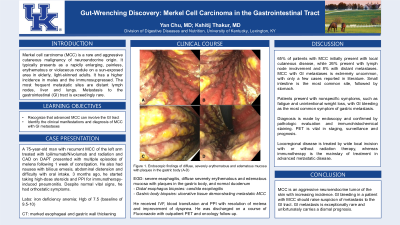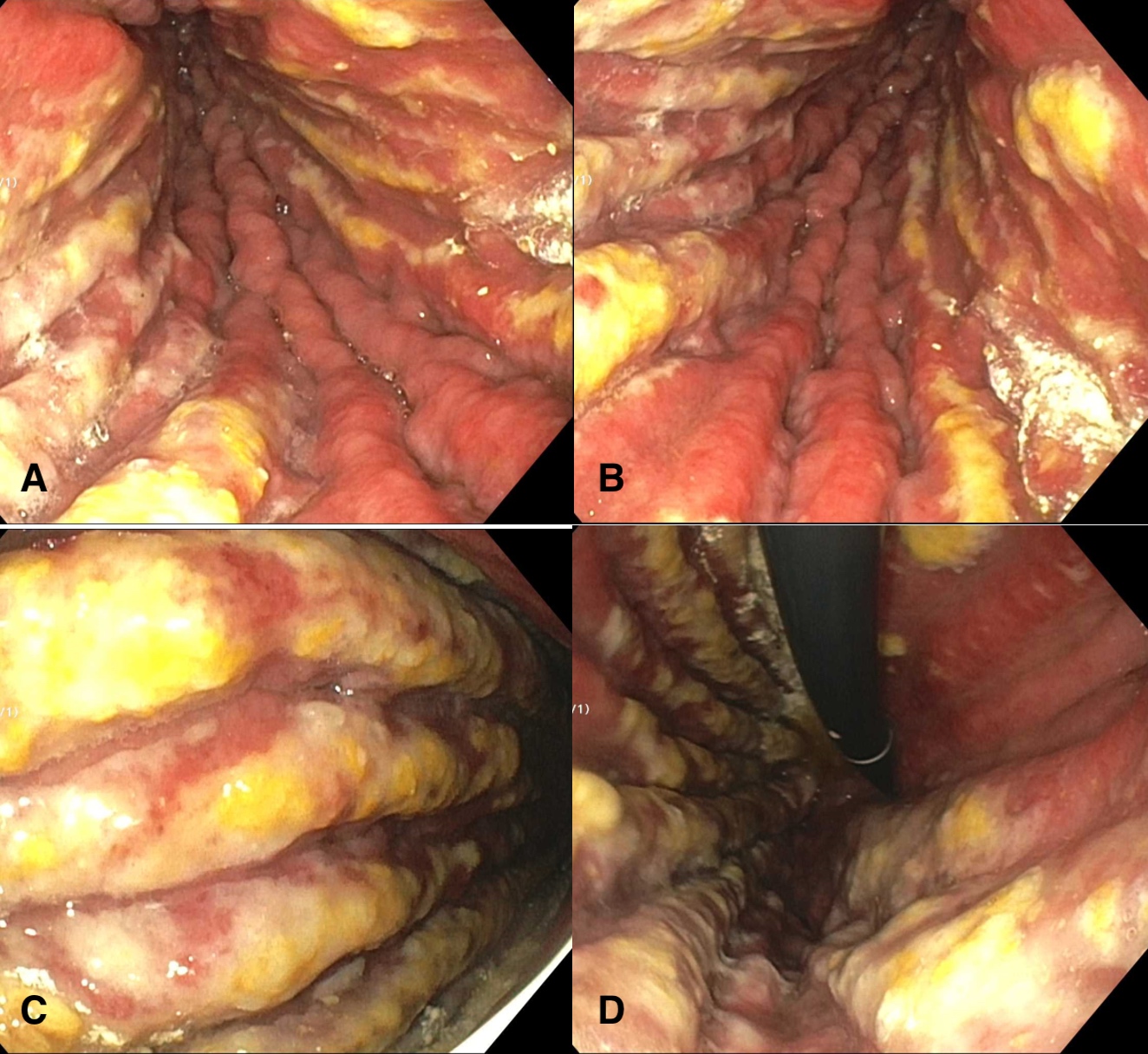Tuesday Poster Session
Category: Stomach
P5086 - Gut-Wrenching Discovery: Merkel Cell Carcinoma in the Gastrointestinal Tract
Tuesday, October 29, 2024
10:30 AM - 4:00 PM ET
Location: Exhibit Hall E

Has Audio
- YC
Yan Chu, MD
University of Kentucky College of Medicine
Lexington, KY
Presenting Author(s)
Yan Chu, MD1, Kshitij Thakur, MD2
1University of Kentucky College of Medicine, Lexington, KY; 2University of Kentucky, Lexington, KY
Introduction: Merkel cell carcinoma (MCC) is a rare and aggressive cutaneous malignancy of neuroendocrine origin. It typically presents as a rapidly enlarging, painless, erythematous or violaceous nodule on a sun-exposed area in elderly, light-skinned adults. It has a higher incidence in males and the immunosuppressed. The most frequent metastatic sites are distant lymph nodes, liver and lungs. Metastasis to the gastrointestinal (GI) tract is exceedingly rare.
Case Description/Methods: A 75-year-old man with recurrent MCC of the left arm on immunotherapy and radiation and CAD on DAPT presented with multiple episodes of melena following 1 week of constipation. He also had nausea, bilious emesis, abdominal distension and difficulty with oral intake. 3 months ago, he started taking high-dose steroids and PPI for immunotherapy-induced pneumonitis. Despite normal vital signs, he had orthostatic symptoms. Labs showed iron deficiency anemia with Hgb of 7.5, decreased from baseline of 9.5-10. CT showed esophageal and gastric wall thickening. EGD performed the next day revealed severe esophagitis, diffuse severely erythematous and edematous mucosa with plaques in the gastric body, and normal duodenum. Distal esophagus biopsy was consistent with candida esophagitis, while gastric body biopsy showed ulcerative tissue demonstrating metastatic MCC. He received blood transfusion and PPI with resolution of melena and improvement of dyspnea. He was then discharged with outpatient PET and oncology follow-up.
Discussion: Approximately 65% of patients with MCC initially present with local cutaneous disease, while 26% present with lymph node involvement and 8% with distant metastases. MCC with GI metastases is extremely uncommon, with only a few cases reported in literature. Small intestine is the most common site followed by stomach. Patients present with nonspecific symptoms, such as fatigue and unintentional weight loss, with GI bleeding as the most common symptom of gastric metastasis. Diagnosis is made by endoscopy and confirmed by pathologic evaluation and immunohistochemical staining. PET is vital in staging, surveillance and prognosis. Locoregional disease is treated by wide local incision with or without radiation therapy, whereas immunotherapy is the mainstay of treatment in advanced metastatic disease. In conclusion, MCC is an aggressive malignancy. GI bleeding in a patient with MCC should raise suspicion of metastasis to the GI tract. GI metastasis is exceptionally rare and unfortunately carries a dismal prognosis.

Disclosures:
Yan Chu, MD1, Kshitij Thakur, MD2. P5086 - Gut-Wrenching Discovery: Merkel Cell Carcinoma in the Gastrointestinal Tract, ACG 2024 Annual Scientific Meeting Abstracts. Philadelphia, PA: American College of Gastroenterology.
1University of Kentucky College of Medicine, Lexington, KY; 2University of Kentucky, Lexington, KY
Introduction: Merkel cell carcinoma (MCC) is a rare and aggressive cutaneous malignancy of neuroendocrine origin. It typically presents as a rapidly enlarging, painless, erythematous or violaceous nodule on a sun-exposed area in elderly, light-skinned adults. It has a higher incidence in males and the immunosuppressed. The most frequent metastatic sites are distant lymph nodes, liver and lungs. Metastasis to the gastrointestinal (GI) tract is exceedingly rare.
Case Description/Methods: A 75-year-old man with recurrent MCC of the left arm on immunotherapy and radiation and CAD on DAPT presented with multiple episodes of melena following 1 week of constipation. He also had nausea, bilious emesis, abdominal distension and difficulty with oral intake. 3 months ago, he started taking high-dose steroids and PPI for immunotherapy-induced pneumonitis. Despite normal vital signs, he had orthostatic symptoms. Labs showed iron deficiency anemia with Hgb of 7.5, decreased from baseline of 9.5-10. CT showed esophageal and gastric wall thickening. EGD performed the next day revealed severe esophagitis, diffuse severely erythematous and edematous mucosa with plaques in the gastric body, and normal duodenum. Distal esophagus biopsy was consistent with candida esophagitis, while gastric body biopsy showed ulcerative tissue demonstrating metastatic MCC. He received blood transfusion and PPI with resolution of melena and improvement of dyspnea. He was then discharged with outpatient PET and oncology follow-up.
Discussion: Approximately 65% of patients with MCC initially present with local cutaneous disease, while 26% present with lymph node involvement and 8% with distant metastases. MCC with GI metastases is extremely uncommon, with only a few cases reported in literature. Small intestine is the most common site followed by stomach. Patients present with nonspecific symptoms, such as fatigue and unintentional weight loss, with GI bleeding as the most common symptom of gastric metastasis. Diagnosis is made by endoscopy and confirmed by pathologic evaluation and immunohistochemical staining. PET is vital in staging, surveillance and prognosis. Locoregional disease is treated by wide local incision with or without radiation therapy, whereas immunotherapy is the mainstay of treatment in advanced metastatic disease. In conclusion, MCC is an aggressive malignancy. GI bleeding in a patient with MCC should raise suspicion of metastasis to the GI tract. GI metastasis is exceptionally rare and unfortunately carries a dismal prognosis.

Figure: Endoscopic findings of diffuse, severely erythematous and edematous mucosa with plaques in the gastric body (A-D)
Disclosures:
Yan Chu indicated no relevant financial relationships.
Kshitij Thakur indicated no relevant financial relationships.
Yan Chu, MD1, Kshitij Thakur, MD2. P5086 - Gut-Wrenching Discovery: Merkel Cell Carcinoma in the Gastrointestinal Tract, ACG 2024 Annual Scientific Meeting Abstracts. Philadelphia, PA: American College of Gastroenterology.
